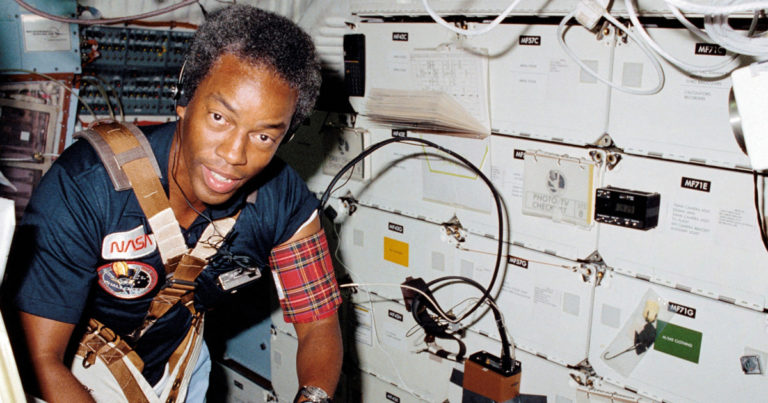Guion Bluford, first African-American in space, is an Eagle Scout

Long before becoming a barrier-breaking astronaut, Guion Bluford was a pretty typical American boy.
He had a paper route, loved playing table tennis and was a Boy Scout, eventually earning Scouting’s highest honor: the Eagle Scout award.
Few could’ve guessed that some day this Eagle Scout would become the first African-American in space.
In celebration of Black History Month, let’s look at Bluford’s remarkable story.
High school, college and Vietnam
While in high school in Philadelphia, Bluford developed a passion for model airplanes. He wanted to become an aerospace engineer, but his high school counselors didn’t think he was college material.
He quickly proved them wrong. Bluford was accepted into the aerospace engineering program at Penn State.
He graduated in 1964 and joined the Air Force. His F-4 fighter squadron was sent to Vietnam, where he flew in 144 combat missions.
After teaching at Sheppard Air Force Base in Texas, he was accepted into the Air Force Institute of Technology. He earned a master’s in 1974 and a Ph.D. in 1978 — both in aerospace engineering.
He applied to the astronaut program that year. As one of more than 8,000 applicants, his chances of getting accepted were low.
Texas sunshine
Bluford got a call from NASA in 1978. They wanted to know what the Pennsylvania native thought of the Texas sunshine.
He was puzzled at the question until they asked him to join NASA’s astronaut training program in Houston.
Bluford spent the next five years training and studying and working hard.
On the soggy morning of Aug. 30, 1983, he was one of five members aboard Space Shuttle Challenger when STS-8 launched. On that day, he became the first African-American in space.
STS-8 was full of former Scouts. Commander Richard Truly is an Eagle Scout. Mission specialists Dale Gardner and William Thornton were First Class and Second Class Scouts, respectively.
Truly went on to head up NASA for nearly three years, and Bluford changed the space program forever.
Breaking barriers
In an interview with NASA, Bluford said he believes he was selected for STS-8 because of his pilot and engineering experience.
The color of his skin wasn’t a factor in the decision, but someone had to be the first African-American astronaut, he said.
“All of us knew that one of us would eventually step into that role,” he said. “I probably told people that I would probably prefer not being in that role, because I figured being the No. 2 guy would probably be a lot more fun.”
It wasn’t till a little later in life that Bluford embraced his role as a pioneer.
“I wanted to set the standard, do the best job possible so that other people would be comfortable with African-Americans flying in space and African-Americans would be proud of being participants in the space program,” he said in the NASA interview.
In the end, Bluford logged four space flights — 688 hours in space — before retiring in 1993.
A special flag
When the Space Shuttle Challenger exploded on Jan. 28, 1986, all of the astronauts aboard — including four former Scouts — were killed.
Challenger carried in its official flight kit an American flag belonging to Troop 514 of Monument, Colo.
Miraculously, the flag was recovered from the Challenger wreckage. It was one of the few items still intact.
On Dec. 18, 1986, NASA returned the Challenger flag to Troop 514 in a special ceremony. Bluford, the Eagle Scout who had flown on the Challenger in two previous missions, had the honor of handing over the flag.
Bluford is pictured second from right in the photo below.

Guion Bluford, first African-American in space, is an Eagle Scout
